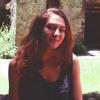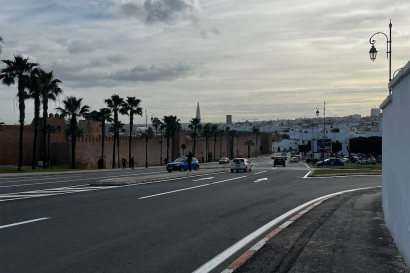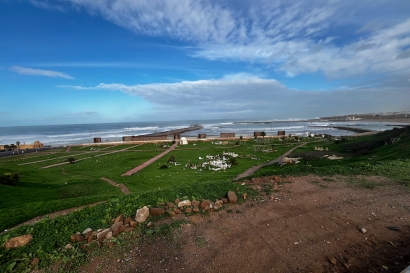It was swelteringly hot the first week of Ramadan in Rabat; even sitting on the terrace at 7:14 p.m., when the sun had just dipped under the horizon, the heat was oppressive. It felt appropriate that the first heat wave of the year had swept the city as the holy month began. It left the ground as parched as the people. It also made fasting difficult.
On that first day at 7:14, my host family and I sat at the table, which was dangerously full of food: steaming lentil and lamb soup (harira), stuffed pastries, flatbreads, sesame sweets, cheeses, and dates. The teapot could not fit and was on the ground. The evening call to prayer rang out from the many mosques in Rabat’s old city, as it does every day at sunset, breaking our fast. We poured big glasses of water, took dates so sweet and soft they broke between our fingers.
Ramadan began May 7th, and has not ended. It will continue for 30 days, depending on the cycle of the moon. I’ve returned home, now, but for the time I was in Morocco during Ramadan—about ten days—I fasted with my host family, joining an important spiritual practice for millions around the world.
It is not expected that foreigners or non-Muslims fast during Ramadan in Morocco, and I am both. But when a taxi driver asked if I was fasting and I replied that I was, he told me he would like to marry me (I laughed this off). My host sisters chuckled disbelievingly at my roommate and I initially, when we told them we would fast, but took it as a sign of respect. Our host mother was pleased. It’s good for the health, she said.
In truth, I chose to fast during Ramadan, yes, out of respect to our family and the people around us, their religion—but also out of curiosity. Islam and its traditions are beautiful, and I saw and heard that each day in Rabat, as the calls to prayer echoed through the city. Yet I felt a great distance from the religion. When I have lived with Catholic host families, for example, I would attend mass with them, though I am not Catholic. In Rabat, I could not go to the mosque, as a non-Muslim. I thought fasting through Ramadan might bring me closer to the religion.
And it did, in expected and unexpected ways. There is a different rhythm to life during Ramadan. The holiday subsumes the city. For ten days, I lived in accordance with it. It began at the 7:14 call to break fast that first day. Until I left Rabat, I awoke each morning in the quiet before dawn at 3:00 a.m. for the suhur meal—the last time we would eat until sunset. The days that week were sticky and hot. People moved slower. Cafes and restaurants were shuttered. By 7, streets emptied in anticipation of iftar, the evening meal.
Your body adjusts to fasting after the first couple of days. You stop feeling as hungry in the morning and afternoon. Rising before dawn starts to feel natural. But I did not realize how fully we had all switched into this new schedule until the third night of Ramadan. After we ate iftar, a couple friends and I wandered around the city where, in the dark, restaurants had thrown open their doors and children ran around, giddy with the excitement of the night, buying popcorn and treats from vendors. There was a parade filling the main avenue, Mohammed V. We watched, in awe. We, too, were wide awake. And we understood.

Katya Schwenk
<p>I'm at junior at Georgetown, studying government, creative writing, and Arabic. I grew up in Vermont and Massachusetts. Interests include (but are not limited to!) radio, poetry, hiking, and beekeeping.</p>








